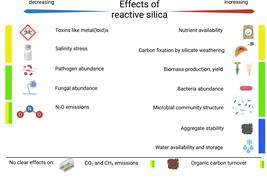27.02.2025

Researchers at the Leibniz Centre for Agricultural Landscape Research (ZALF) have shown in a recent publication in the journal Plant and Soil that reactive silica is a crucial factor for soil health. The study points out that a deficiency of this element can be used as an early warning signal for soil degradation long before visible damage occurs.
Healthy soils are the basis for stable crop production and resilient ecosystems. Until now, soil quality and fertility have been assessed primarily based on parameters such as organic matter, nutrient content or soil structure. The current study proposes to use reactive silica – in the form of dissolved silica and amorphous silica – as an additional indicator.
"Our research shows that the content of reactive silica is a sensitive early indicator of the condition of the soil. A decline in this element often occurs before other signs of soil degradation become visible," explains
Prof. Jörg Schaller from ZALF, first author of the study.
Early warning system for soil degradation
Soils with low levels of reactive silica lose their structure faster and store less water. Regions particularly affected by drought could benefit from targeted management of the reactive silica content.
"We recommend systematically integrating the reactive silica content into soil analyses. This could help farmers and policymakers to take early action against soil degradation," Prof. Schaller continues.
How can this knowledge be used?
The results suggest that a targeted accumulation of amorphous silica in the soil, for example by incorporating silicon-rich plant residues or specific fertilizers, can improve soil quality.
"If we transfer these findings to agricultural practice, we could not only stabilize the yield in the long term, but also reduce the use of irrigation and chemical fertilizers," adds Prof. Schaller.
The researchers call for further research on the potential of amorphous silica for soil management and for concrete measures to be developed for different agricultural systems.
Further Information:
https://link.springer.com/article/10.1007/s11104-025-07299-5
Project partner:
- Landscape Research (ZALF)
- Justus Liebig University Giessen
- Oregon State University
- Martin Luther University Halle-Wittenberg
- University of Potsdam
- Freie Universität Berlin
Funding:
Open Access funding enabled and organized by Projekt DEAL.
Text disclaimer:
This is a summary of the original text created with the help of artificial intelligence:
Jörg Schaller, Markus Kleber, Daniel Puppe, Mathias Stein, Michael Sommer, Matthias C. Rillig (2025): The importance of reactive silica for maintaining soil health. Plant and Soil https://doi.org/10.1007/s11104-025-07299-5 – published Open Access under the
CC BY 4.0.license.
The text has been carefully reviewed and revised under the aspects of AI regulations at ZALF.
